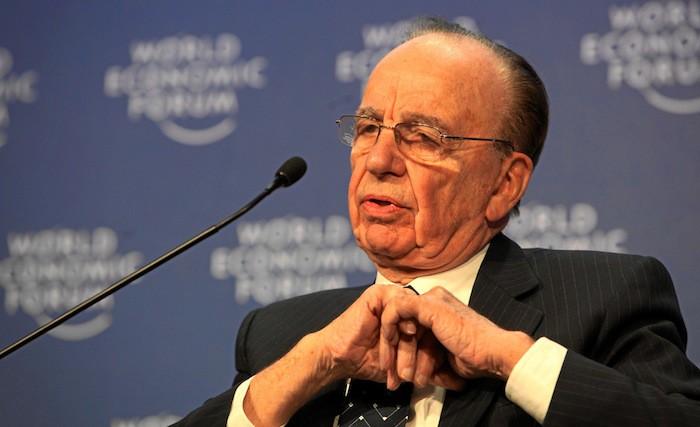
No surprise, in this age of rampant private gain over public interest, that Rupert Murdoch has re-emerged. Like a boxer who can be knocked about the ring and to the mat but never knocked out, Murdoch, CEO of 21st Century Fox, now makes a new bid for a company he has long sought to control: Sky.
He found himself on the brink of buying the company (called BSkyB until its 2014 rebranding), in which 21st Century Fox holds a 39 percent stake, just five years ago. Then Hackgate happened. That scandal, now a more distant thought in the Brexit-shaken U.K. mind, deprived Murdoch of his prize. Political allies fell quickly by the wayside, and those regulating fair competition found a backbone and short-circuited a deal.Now, though, Murdoch, is back — or, we should really say, the Murdochs, as James Murdoch, chair of Sky, sits in the middle of this agreement. The news of this morning: 21st Century Fox has offered $14.1 billion for the 61 percent of the company it doesn’t own, a 36 percent premium over its pre-bid price. If the deal goes through this time, Fox will own a major entertainment news platform across the continent, serving more than 20 million customers in England, Ireland, Italy, Germany, and Austria.
Sky, with an identity as a “pay TV” satellite company, has gone the Triple Play route. Like its counterparts such as Comcast in the U.S., Sky has added broadband and mobile services, and its Now TV offers an alternative to Netflix.
In the modern communications business, scale is all-important. As cordcutters push the churn (cancellation) rates of the providers like Sky to the 10-percent level, these companies continue to bulk up in defense, a strategy familiar to those who have followed the similar paths of Verizon and AT&T. Scale provides cash flow and the ability to diversify into multiple distribution modes that require major technology investments, while reducing competition for sports rights, an especially pivotal differentiator with European football.
I noted two months ago that Murdoch would likely soon enter the ring to claim Sky. He now sees the exquisite timing extant at the end of an exhausted 2016.
In a year of both Brexit and Donald Trump, the always-wily Murdoch has waited for the world to come back to him. Timing and patience have long been the last news titan’s enviable traits.
The Sky offer finds fertile ground in two major developments of our time.
Despite discussion over the last couple of years that a Teddy Roosevelt–like trust-busting era needs to emerge — tackling the issues of unprecedented bigness in the digital and entertainment trades — quite the opposite is unfolding. We are in a new age of digital robber barons.
We’re now into a time of anti-regulation — big-league. Donald Trump’s Cabinet and advisory position appointments scream anti-regulation. Even the beleaguered newspaper industry finally sees a way of leapfrogging old cross-ownership roles, as Trump remakes the Federal Communications Commission.In Britain, Fox is acting on its reading of that parallel landscape. Britain itself is reeling from Brexit, not knowing which end is up in its commerce and trade future. As the common market wanes, the Murdoch market waxes. You want European cooperation? Let Sky bring it to you, crossing the borders with whatever the public will pay for to get its entertainment and communication goodies. Consider the Sky political opening a consequence of Murdoch’s own press support for Brexit, just as his U.S.-owned media — Fox News and The Wall Street Journal — contributed to the Trump victory (with the Journal more a case, of course, of waiting on the sidelines for the Fox-fueled victory dance).
Second, and of course directly related to a further movement against regulation, the Fox/Sky move marks the further consolidation of the newest media in the hands of fewer, older players. Comcast. Charter/Time Warner Cable. Verizon, which now owns both AOL and Yahoo. AT&T, now trying to finalize its $86 billion Time Warner buy, after buying DirecTV.
Old regulatory rules look at “market domination” — certainly a worthy concern, but one that doesn’t well take into account wider societal concerns about fewer companies controlling information flow in the digital age.What’s the remedy for this kind of bigness? More bigness, if you listened to entrepreneur Mark Cuban testifying before the Senate this week on that AT&T/Time Warner deal:
“We need more companies…with the ability to compete with Apple, Google, Microsoft, Amazon and Facebook. Delivering content to consumers in this app-driven world is not easy, it is very expensive and difficult….Alone, it will be very difficult, if not impossible, for either AT&T or Time Warner to compete with any of the companies I’ve mentioned. Together, it will still be difficult, but a combined entity at least gives them a chance to battle the dominant players in the marketplace and increase consumer choice and competition for consumer attention.”
Cuban’s not wrong about the dicey nature of the competition in this old media/new media sweepstakes, but it leaves us all in a similarly uneasy place. Who speaks for the citizens and the consumers in this time of private gain over public interest? Do we expect AT&T, or Sky, to deal better with fake news than Facebook? Should we all be so dependent on so few companies to decide what we get and what we don’t get? What are the cultural implications, and the next-stage political ones, on both sides of the Atlantic?
Photo by World Economic Forum used under a Creative Commons license.